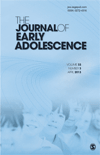
JOURNAL OF EARLY ADOLESCENCE
Scope & Guideline
Exploring the Dynamics of Youth Growth and Change
Introduction
Aims and Scopes
- Interpersonal Relationships and Peer Influence:
Research frequently explores the dynamics of friendships, peer influence, and social interactions, examining how these relationships impact academic ambitions, emotional well-being, and behavior. - Family Dynamics and Parenting:
The journal emphasizes the role of family, including parenting practices, family conflict, and parental involvement, in shaping adolescents' emotional, social, and academic outcomes. - Cultural and Socioeconomic Contexts:
Studies often address how cultural background, economic status, and community environments influence adolescent behavior, identity formation, and mental health. - Mental Health and Emotional Development:
The journal publishes research on emotional regulation, internalizing and externalizing problems, and mental health challenges faced by adolescents, highlighting risk and protective factors. - Academic Engagement and Achievement:
A significant focus is placed on factors influencing academic performance, including motivation, educational expectations, and the impact of social contexts on learning outcomes. - Substance Use and Risk Behavior:
Research frequently investigates patterns of substance use and associated risk behaviors, considering the role of peer influence, family dynamics, and socioeconomic factors. - Identity Formation and Self-Concept:
The journal explores issues related to identity development, including ethnic identity, gender roles, and self-esteem, particularly within the context of peer and family relationships.
Trending and Emerging
- Digital Media and Technology Use:
Research has increasingly focused on the effects of social media, digital communication, and online behaviors on adolescents' mental health, social skills, and identity formation. - Mental Health Resilience:
There is a growing emphasis on understanding resilience factors that contribute to positive mental health outcomes among adolescents, particularly in the context of adversity. - Intersectionality and Identity Diversity:
Emerging studies are exploring the complexities of identity, including how intersecting factors such as ethnicity, gender, and socioeconomic status influence adolescent experiences. - Impact of COVID-19 on Adolescent Development:
Research addressing the effects of the COVID-19 pandemic on adolescents' mental health, social interactions, and educational engagement has surged, reflecting the urgency of this global event. - Community and Environmental Influences:
Recent publications have increasingly examined how neighborhood environments, community resources, and social support systems impact adolescent development and well-being. - Peer Relationships and Academic Outcomes:
A notable trend includes the exploration of how peer relationships and social support networks influence academic engagement and achievement, moving beyond individual factors.
Declining or Waning
- Traditional Bullying Dynamics:
Research on traditional bullying dynamics has decreased as the focus has shifted towards understanding cyberbullying and digital interactions among adolescents. - Single-Dimensional Studies on Academic Performance:
There is a noticeable decline in studies solely focused on academic performance without considering the broader context of emotional and social factors influencing learning. - Gender Differences in Isolation:
Previously prevalent discussions on gender differences in social isolation are now less common as research increasingly emphasizes intersectionality and multifaceted identity issues. - Static Models of Development:
The journal has moved away from static models of development, favoring more dynamic and longitudinal approaches that capture the changing nature of adolescent experiences. - Overemphasis on Risk Factors:
There is a waning focus on merely identifying risk factors without exploring resilience and positive development, reflecting a broader trend towards understanding strengths in youth.
Similar Journals
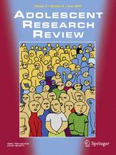
Adolescent Research Review
Illuminating the path to better adolescent health and education.Adolescent Research Review, published by SPRINGER INT PUBL AG, is a leading academic journal dedicated to advancing the understanding of adolescent development across multiple disciplines, including Developmental and Educational Psychology, Pediatrics, Psychiatry, and Social Sciences. With an impressive impact factor, this journal ranks Q1 in four critical categories, reflecting its commitment to high-quality research and its influential role within the academic community. Since its inception in 2016, it has become an essential resource for researchers, professionals, and students seeking to explore the complexities of adolescence. The journal not only highlights innovative studies and theoretical advancements but also fosters interdisciplinary dialogue that informs policies and practices surrounding youth. With an assimilative approach to various fields, Adolescent Research Review serves as a vital platform for groundbreaking research that seeks to improve the well-being of adolescents worldwide.
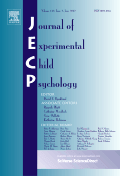
JOURNAL OF EXPERIMENTAL CHILD PSYCHOLOGY
Transforming Theories into Practice in Child PsychologyJOURNAL OF EXPERIMENTAL CHILD PSYCHOLOGY, published by Elsevier Science Inc, stands as a premier outlet for high-quality research in the fields of Developmental and Educational Psychology and Experimental and Cognitive Psychology. With an impressive impact factor and recognized within the Q1 category for both developmental and experimental psychology, this journal is dedicated to advancing our understanding of child psychology through rigorous empirical research and theoretical contributions. Indexed with an ISSN of 0022-0965 and E-ISSN 1096-0457, it is a vital resource for scholars aiming to explore the complexities of children's cognitive, social, and emotional development from 1964 to 2024. Engaging with this journal provides researchers, professionals, and students access to cutting-edge findings that inform practice, policy, and future studies in the ever-evolving landscape of child psychology.
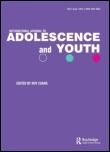
International Journal of Adolescence and Youth
Shaping the future of adolescent studies through open access.The International Journal of Adolescence and Youth, published by Routledge Journals, Taylor & Francis Ltd, stands as a premier platform dedicated to advancing the understanding of the social, emotional, and psychological dimensions affecting youth and adolescence. With an ISSN of 0267-3843 and an E-ISSN of 2164-4527, this esteemed journal has been committed to open access since 2014, allowing for broad dissemination of research that informs policy and practice. Based in the United Kingdom, this journal has exhibited its critical importance in the field by achieving a Q1 ranking in Health (social science) and placing 20th out of 371 in Scopus rankings with a remarkable 94th percentile standing. Covering a comprehensive range of topics from mental health to social influences, the journal serves as an essential resource for researchers, professionals, and students alike who are engaged in the multidisciplinary study of adolescent health and development. The publication timeline spans from 1987 to 2024, reflecting its rich history and commitment to contributing valuable knowledge to the academic community.
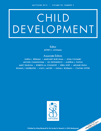
CHILD DEVELOPMENT
Connecting disciplines to foster holistic child development.CHILD DEVELOPMENT, published by WILEY, stands as a premier journal in the fields of developmental and educational psychology, education, pediatrics, perinatology, child health, and social work. Established in 1945, it has consistently maintained a strong impact, underscored by its 2023 Q1 ranking in multiple relevant categories, as well as its esteemed positions within Scopus rankings, including a remarkable 14th place in Pediatrics. The journal serves as a vital resource for researchers and professionals, offering rigorous peer-reviewed articles that explore pivotal aspects of child development through a multidisciplinary lens. Although it does not currently offer open access options, CHILD DEVELOPMENT remains influential, addressing critical topics in child psychology, policy implications, and educational practices. Researchers and students alike will find the journal’s comprehensive scope instrumental in advancing their understanding and fostering an evidence-based approach to contemporary child development issues.

Psychology Society & Education
Connecting Minds: Shaping Education and Society TogetherPsychology Society & Education is a distinguished journal published by EDITORIAL UNIV CORDOBA-UCOPRESS, dedicated to exploring the intersections of psychology, education, and society. With an ISSN of 2171-2085 and an E-ISSN of 1989-709X, this Open Access journal has been providing freely accessible scholarly articles since 2009, ensuring a wide dissemination of knowledge within the academic community. Based in Spain, the journal ranks favorably in its categories, including Q3 in Clinical Psychology and Q3 in Education, illustrating its growing impact in these fields. Offering a platform for rigorous research, reviews, and discussions, Psychology Society & Education invites contributions that advance understanding of psychological principles applied within educational contexts and societal dynamics. Its role in bridging research with practical applications makes it an essential resource for researchers, professionals, and students aiming to contribute to the evolving discourse surrounding psychology and education.

JOURNAL OF GENETIC PSYCHOLOGY
Exploring the Genetic Roots of Mind and BehaviorJOURNAL OF GENETIC PSYCHOLOGY, published by Routledge Journals, Taylor & Francis Ltd, stands as a prominent outlet within the fields of Clinical Psychology, Developmental Psychology, and Life-span Studies. Since its inception in 1946, this journal has played a pivotal role in disseminating transformative research that explores the intricate links between genetics and psychological phenomena. With an impact factor that reflects its scholarly rigor and recognition, the journal is categorized in the Q2 quartile across multiple psychology domains, underscoring its significance in advancing knowledge and practical applications in psychological sciences. The journal features a broad range of articles—from empirical studies to theoretical reviews—fostering a vibrant academic dialogue among researchers, professionals, and students alike. Although currently not an open-access journal, it provides robust subscription options for institutions and individuals seeking to engage with cutting-edge research. Whether you are looking to enrich your academic portfolio or stay at the forefront of psychological science, JOURNAL OF GENETIC PSYCHOLOGY remains an essential resource. For more information or to explore our latest issues, please visit our site.
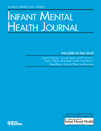
INFANT MENTAL HEALTH JOURNAL
Transforming Insights into Infant CareThe INFANT MENTAL HEALTH JOURNAL, published by Wiley, is a leading peer-reviewed journal dedicated to advancing research in the fields of developmental and educational psychology, pediatrics, and mental health, with a strong emphasis on the psychological development of infants and young children. Since its inception in 1980, the journal has played a critical role in disseminating valuable insights and innovative methodologies that inform practices and policies affecting child welfare and mental health. With an impressive standing in both Developmental and Educational Psychology (Q2) and Pediatrics, Perinatology and Child Health (Q1), it ranks among the top journals in its field, as evidenced by its Scopus rankings. The journal is essential for researchers, clinicians, and students aiming to enhance their understanding of infant mental health and its implications for early development. By publishing high-quality research and reviews, the INFANT MENTAL HEALTH JOURNAL continues to shape the landscape of infant mental health research, fostering collaboration and exploration in this vital area of study.
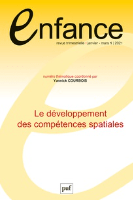
Enfance
Illuminating the Complexities of Child GrowthEnfance, established in 1949 and published by PRESSES UNIV FRANCE, is a distinguished academic journal specializing in the multidisciplinary study of childhood and development. With its ISSN 0013-7545 and E-ISSN 1969-6981, it serves as a vital platform for researchers, educators, and practitioners interested in the complexities of child development, education, and health. While not open access, Enfance has carved its niche within the arts and humanities as well as social sciences, as reflected in its 2023 category quartiles and Scopus rankings. These accolades underscore its relevance, particularly in developmental and educational psychology, education, and pediatrics. The journal's commitment to advancing understanding within these fields through rigorous, peer-reviewed research makes it an essential resource for those dedicated to improving the wellbeing and development of children globally. Situated in Paris, France, Enfance continues to be at the forefront of innovative discussions in the study of childhood, making significant contributions to both academic and practical applications.
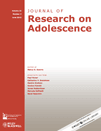
JOURNAL OF RESEARCH ON ADOLESCENCE
Shaping Tomorrow's Perspectives on AdolescenceWelcome to the Journal of Research on Adolescence, a premier publication dedicated to advancing the understanding of the complex developmental processes of adolescence. Published by Wiley in the United Kingdom, this journal has established itself as a vital resource in the fields of Behavioral Neuroscience, Cultural Studies, and Developmental and Educational Psychology, proudly holding a Q1 ranking across multiple categories in the 2023 Scopus ranking system. With its ISSN 1050-8392 and E-ISSN 1532-7795, the journal supports a rich tradition of scholarly exploration and interdisciplinary dialogue since its inception in 1993. Although not an open-access journal, it offers subscription-based access to its critical insights and research findings. Aspiring to provide a platform for researchers, educators, and policymakers, the Journal of Research on Adolescence fosters innovative approaches and diverse perspectives necessary for understanding and addressing the challenges faced by today's youth. Join us as we delve into the ever-evolving landscape of adolescent research, shaping the discourse for future generations.
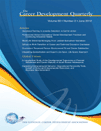
CAREER DEVELOPMENT QUARTERLY
Empowering professionals with cutting-edge career knowledge.The Career Development Quarterly is a prominent academic journal published by Wiley, dedicated to advancing the field of career development through rigorous research and insightful perspectives. Since its inception in 1986, the journal has served as a pivotal platform for scholars and practitioners in Applied Psychology, Organizational Behavior, and related fields, consistently achieving recognition in the second quartile across various categories, with notable Scopus rankings that underscore its influence. With an ISSN of 0889-4019 and an E-ISSN of 2161-0045, the journal encompasses diverse topics related to career counseling, workforce development, and human resource management, making it essential reading for anyone looking to deepen their understanding of career dynamics. The journal promotes a blend of empirical research, theoretical frameworks, and practical applications, ensuring its relevance and appeal to researchers, professionals, and students alike. While it is not an open access publication, it provides valuable insights that facilitate the exploration of career pathways and organizational strategies, contributing significantly to both academic discourse and professional practice.